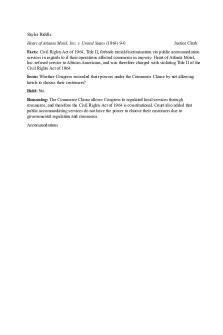Heart of Atlanta Motel v. U.S. case brief PDF

| Title | Heart of Atlanta Motel v. U.S. case brief |
|---|---|
| Author | marco cervantes |
| Course | Contract Law |
| Institution | Texas State University |
| Pages | 2 |
| File Size | 68 KB |
| File Type | |
| Total Downloads | 66 |
| Total Views | 136 |
Summary
brief...
Description
POLS 4335 Constitutional Law II Michael Freeman 000670463
Dr. Domino 4/9/2021
I.
Case brief and citation: Heart of Atlanta Motel v. United States (379 US 241)
II.
Facts of the case: A. In 1964, there was a civil rights act passed that ended segregation in public places as well as employment discrimination on any basis. A lot of people, especially in the south, opposed to this ruling. B. The Heart of Atlanta Motel in Atlanta, Georgia, opposed the Civil Rights Act of 1964 and refused to accept Black Americans into their motel. They refused to rent any of their over 200 rooms to anyone of African-American descent. The U.S. government urged the Heart of Atlanta Motel to ban the discrimination of black Americans under Title II of the Civil Rights Act of 1964.
III.
Constitutional questions: A. Are public accommodations free from Commerce Clause powers? B. Does the Commerce Clause extend to racial discrimination? C. Is there a certain amount of revenue a business is supposed to bring in to be affected by the Commerce Clause? D. If the motel was a private business, would they be subject to the Commerce Clause and Title II of the Civil Rights Act?
IV.
Holding: A. In a unanimous decision, the court ruled in favor of the United States with the majority opinion being delivered by Justice Tom Clark.
V.
Reasoning: A. The court determined that because the motel affects interstate commerce, it cannot be subject to discrimination and can be regulated by the U.S. government. Title II of the Civil Rights Act of 1964 states that “All persons shall be entitled to the full and equal enjoyment of the goods, services, and accommodations of any place of public accommodation.”
B. The motel does indeed affect commerce because of the revenue that it brings in so it can be regulated by the U.S. government. The court also determined that it is also a moral problem, but it does not detract from the fact that it affects interstate commerce. C. The court also stated that the Act does not deprive liberty or property under the Fifth Amendment. Congress has a rational basis to determine whether public accommodations are restricting access via discrimination.
VI.
Separate opinions: A. Concurring: Justices Black, Douglas, and Goldberg agreed with the ruling but concurred with the reasoning. Justice Black stated that there is no need to have a longstanding interpretation of the Commerce Clause for it to uphold the Court’s ruling. Justice Douglas stated that he agrees with the ruling but is somewhat hesitant in the idea that the rights of the people can be regulated by the U.S. government. Justice Goldberg agrees with the purpose of the Civil Rights Act of 1964. B. Dissenting: Because the decision was unanimous, there were no dissenting opinions.
VII.
Impact: A. This case would later be referenced for hundreds of case in the future and was
one of the first cases of racial discrimination after the enactment of the Civil Rights Act of 1964. The Commerce Clause was not violating the motel’s rights because of the fact that racial discrimination is not up for debate....
Similar Free PDFs

Barrenblat v US Case Brief
- 2 Pages

US v sokolow - case brief
- 2 Pages

(Case Brief) US v. Nixon
- 2 Pages

Nixon v US Case Brief
- 2 Pages

US v White - case brief
- 2 Pages

Olmstead V US - case brief
- 2 Pages

Brief Sabri v US
- 2 Pages

Watkins v US Brief
- 1 Pages

US v. Lopez (1995) Case Brief
- 2 Pages

Brief US Commission v Geraghty
- 6 Pages

Us vs ala - Case Brief
- 7 Pages

Nicaragua v Us Case Digest
- 4 Pages
Popular Institutions
- Tinajero National High School - Annex
- Politeknik Caltex Riau
- Yokohama City University
- SGT University
- University of Al-Qadisiyah
- Divine Word College of Vigan
- Techniek College Rotterdam
- Universidade de Santiago
- Universiti Teknologi MARA Cawangan Johor Kampus Pasir Gudang
- Poltekkes Kemenkes Yogyakarta
- Baguio City National High School
- Colegio san marcos
- preparatoria uno
- Centro de Bachillerato Tecnológico Industrial y de Servicios No. 107
- Dalian Maritime University
- Quang Trung Secondary School
- Colegio Tecnológico en Informática
- Corporación Regional de Educación Superior
- Grupo CEDVA
- Dar Al Uloom University
- Centro de Estudios Preuniversitarios de la Universidad Nacional de Ingeniería
- 上智大学
- Aakash International School, Nuna Majara
- San Felipe Neri Catholic School
- Kang Chiao International School - New Taipei City
- Misamis Occidental National High School
- Institución Educativa Escuela Normal Juan Ladrilleros
- Kolehiyo ng Pantukan
- Batanes State College
- Instituto Continental
- Sekolah Menengah Kejuruan Kesehatan Kaltara (Tarakan)
- Colegio de La Inmaculada Concepcion - Cebu



